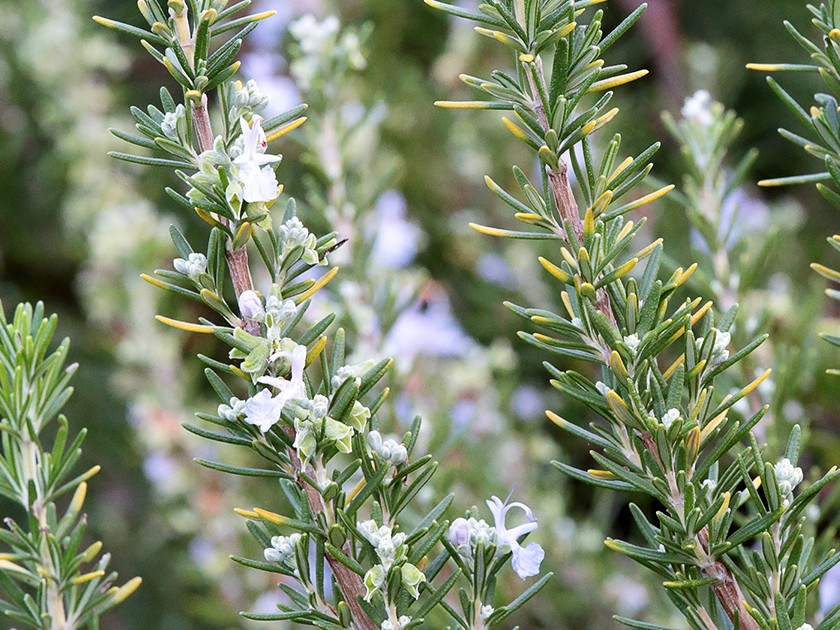The world of herbs and botanicals is a treasure trove of scents, flavors, and medicinal properties. Among them, rosemary stands tall as a fragrant and versatile herb that has found its way into kitchens, gardens, and wellness routines. But for those who share their lives with feline companions, a critical question arises: Is rosemary safe for cats?

In this article, we embark on a journey to explore the potential benefits and risks of incorporating rosemary into your cat’s environment, shedding light on whether this aromatic herb can peacefully coexist with your beloved whiskered friend.
As we dig into the depths of botanical knowledge, we aim to provide cat owners with the insights they need to make informed choices that prioritize the well-being and health of their furry companions.
What Is Rosemary?
Rosemary, or Rosmarinus officinalis, belongs to this family of mints and is a perennial plant. It comes from the Mediterranean region, but can be found in many parts of the world.
It has needle-like leaves that are green on top and white on the bottom. The flowers, which appear in spring or summer, also have tiny blue, violet, red and white blossoms.
Rosemary is a popular culinary herb because it may enhance the flavor of a variety of foods, including meats, soups, salads, and breads. It is also used as a medicinal herb since it contains anti-inflammatory, antioxidant, antibacterial, antifungal, and antispasmodic compounds.
It can help with a variety of health conditions, including digestive disorders, respiratory infections, headaches, memory loss, and stress.
Rosemary can add beauty and aroma to any garden and is often used as an ornamental plant. Its bright blossoms attract bees, butterflies, and hummingbirds. Its powerful aroma can also repel pests such as mosquitoes, flies, and moths.
Also, because it can be beneficial for aromatherapy, rosemary is used as an essential oil. It may be beneficial for stimulating the nervous system, boosting mood and concentration, soothing pain and tiredness, and promoting hair growth.
How Does Rosemary Affect Cats?
Rosemary has a different effect on cats than it does on people. While people can consume rosemary in moderation without incident, cats may have some troubles with it. This is due to the fact that cats’ metabolism and digestive systems differ from that of humans. They also have a distinct sense of smell and taste when compared to humans.
The American Society for the Prevention of Cruelty to Animals (ASPCA) states that rosemary is not hazardous to cats[1]. However, this does not imply that rosemary is beneficial to cats or that cats can freely consume rosemary.

Camphor, cineole, linalool, and verbinol are among the volatile oils found in rosemary. If cats consume too much rosemary, it might cause gastrointestinal discomfort. They can also irritate the skin or induce allergic responses.
As a result, you should limit your cat’s exposure to rosemary and only give it modest amounts on occasion. You should also keep an eye on your cat after giving it rosemary for any signs of discomfort or distress. Vomiting, diarrhea, loss of appetite, drowsiness, drooling, itching, swelling, or difficulty breathing are some of the symptoms.
If you detect any of these indicators in your cat after giving it rosemary, or if you suspect that your cat has eaten too much rosemary unintentionally or on purpose, you should cease giving it rosemary immediately and consult your veterinarian.
What Are The Benefits Of Rosemary For Cats?
Rosemary may provide some benefits for cats if given in tiny doses on a regular basis[2].
Among these advantages are:
Rosemary contains antioxidants, which can help protect your cat’s cells from oxidative damage caused by free radicals. This can aid in the prevention or postponement of aging-related disorders such as cancer, arthritis, diabetes, and cataracts.
Rosemary has anti-inflammatory characteristics that can assist your cat’s body minimize inflammation and suffering. This can aid in the treatment of illnesses such as arthritis, dental disease, skin disorders, and wounds.
Rosemary contains antibacterial characteristics that can aid in the battle against bacteria, fungus, viruses, and parasites that may infect your cat’s body.
What Are The Risks Of Rosemary For Cats?
Rosemary may pose certain dangers to cats if fed in big quantities on a regular basis. Among these dangers are: [3]

Gastrointestinal:
Rosemary can cause gastrointestinal upset in cats if they ingest too much of it. This might cause nausea, diarrhea, loss of appetite, and stomach pain. This can also cause your cat to get dehydrated or have an electrolyte imbalance.
Allergic:
Rosemary can cause allergic reactions in cats if they are sensitive or intolerant to it. This can cause skin irritation, itching, swelling, and hives. This can also result in anaphylaxis, a severe and sometimes fatal allergic reaction that can cause trouble breathing, shock, or death.
Toxic:
Rosemary can be toxic to cats if they ingest a large amount of it or if they ingest the essential oil of rosemary. This can lead to central nervous system depression, which can induce drowsiness, weakness, confusion, seizures, coma, or death.
How to Use Rosemary Safely and Responsibly Around Your Cat?
If you want to use rosemary around your cat, follow these precautions to ensure his or her safety and well-being[4]
- Use rosemary sparingly and infrequently, whether it’s fresh or dried. Give your cat no more than a pinch of rosemary at a time and no more than once a week. You can add rosemary to your cat’s food or water, or brew a weak tea with rosemary and water and offer it to your cat as a treat.
- Avoid using rosemary essential oil near your cat. Rosemary essential oil is highly concentrated and strong, and ingesting or inhaling it can be hazardous to cats. Use rosemary essential oil sparingly on your cat’s skin, fur, or paws.
- Do not use rosemary essential oil to diffuse in your home or car. Use rosemary essential oil sparingly on your cat’s bedding, toys, or litter box.
- Keep rosemary plants out of reach of your cat. If you grow rosemary in your garden or in a pot, be sure your cat can’t get to it or eat it. You may protect your rosemary plants from your cat with a fence, a net, or a cover.
- To dissuade your cat from accessing your rosemary plants, add some deterrents around them, such as lemon peels, coffee grinds, or cayenne pepper.
- After giving your cat rosemary, keep an eye out for any signs of pain or distress. Stop providing rosemary to your cat if you observe any signs of gastrointestinal distress, allergic reaction, or poisoning. Contact your veterinarian immediately.
FAQs
Q1: Can I use rosemary as a natural remedy for my cat’s health issues?
A: While rosemary has been hailed for its potential health benefits, it’s crucial to consult your veterinarian before introducing any herbs, including rosemary, into your cat’s diet. Professional guidance ensures your cat’s safety and avoids potential health risks.
Q2: Is it safe to use rosemary-infused products around my cat, such as sprays or diffusers?
A: The scent of rosemary can be pleasing, but some cats may be sensitive to strong odors. It’s wise to observe your cat’s behavior around such products. If you notice any signs of discomfort, it’s best to discontinue their use and provide a cat-friendly environment.
Q3: Can rosemary be harmful to cats if consumed accidentally?
A: Yes, certain compounds in rosemary can pose a risk if ingested in large quantities. Keep rosemary plants out of your cat’s reach and avoid using it excessively in dishes your cat may have access to.
Q4: Are there any cat-safe alternatives to rosemary for enhancing my home’s fragrance?
A: Absolutely! Cat-safe alternatives include lavender (in moderation), catnip, and valerian root. These options offer pleasant scents without posing significant risks to your feline friends.
Q5: How can I ensure my cat’s safety when using rosemary in my home?
A: Introduce rosemary gradually and in controlled amounts. Monitor your cat’s behavior and health for any adverse reactions. If you’re uncertain, consult your veterinarian before using rosemary in your cat’s environment.
Conclusion
As we conclude our journey through the aromatic realm of rosemary, we find ourselves armed with knowledge to make informed decisions about its presence in our feline-filled abodes. Rosemary, with its fragrant allure and versatile uses, can indeed be a delightful addition to our lives.
However, it is imperative to tread cautiously and prioritize the safety and health of our beloved cats. By consulting with veterinarians, monitoring our cats’ reactions, and ensuring moderation, we can strike a balance between enjoying the aromatic charm of rosemary and safeguarding the well-being of our furry companions.
References:
- Genovese, A. G., McLean, M. K., & Khan, S. A. (2012b). Adverse reactions from essential oil-containing natural flea products exempted from Environmental Protection Agency regulations in dogs and cats. Journal of Veterinary Emergency and Critical Care, 22(4), 470–475.
- Ebani, V. V., & Mancianti, F. (2020). Use of essential oils in veterinary medicine to combat bacterial and fungal infections. Veterinary Sciences, 7(4), 193.
- Tamuvetmed. (2022b, March 11). A scent-sitive subject: Essential oil diffusers and your cat | VMBS News. VMBS News.
- Houseplants: toxic for pets? (n.d.). The University of Vermont.

